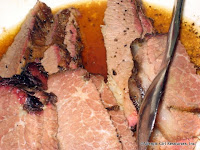Save The Deli, David Sax
Smoked brisket at Blue Smoke . Not Kosher but delicious:

***
Deli for me, or more pointedly deli meat like corned beef, pastrami and brisket has a deep and profound place in my heart and in my mind. I imagine I’m like many New York Jews in that way. Food is memory and well-made pastrami can be the best memory evah. I may not be old enough to remember when this city during the golden age of the Jewish deli (that would have been my grandparents’ or great-grandparents’ time in Brooklyn) but my lingering hunger for pastrami is a deep desire for history.
William Helmreich (CUNY) is quoted as saying in David Sax's new book, Save the Deli: “Younger [Jews] who go into delis, are practicing something us sociologists call ‘symbolic ethnicity’...when Jews go to a deli, they’re ethnically bonding, expressing common roots of our shared culture.” (And for the non-Jews, Sax’s quotes Helmreich as saying: “In the deli, you can walk in a goy and walk out a Jew...maybe a pound heavier.”)
So, millions of us have a deep connection to deli. But if you’ve noticed in the last few years, at least here in New York City, the deli is dying, going out of business or adding some really odd, tref items to their menus in an attempt to keep up with American cuisine, tastes and diets (much to the deli lover’s chagrin).
David Sax , in Save the Deli, (published by HMH and sold through Amazon.com) takes the reader on a meaty journey of the history of the delicatessen and its dare-we-say bleak future. He writes a neatly detailed account of the birth of the New York Jewish deli, and spends considerable time on the intersection between food, Jews and real estate. He then attempts to answer the very-mournful (cue music in a minor key) question of why the deli is dying.
He ponders: “Does the salvation of the American Jewish delicatessen lie in maintaining a strong connection with its origins in New York or will a local approach ultimately win more hearts and mouths?” So he takes us on a cross-country journey to the delis of America. “If a solution to the save the deli exists, it rests in the patchwork of states where over million American Jews live.” What he finds is some delicious second and third generation deli, as well as some deli done in new, innovative ways.
But what does it all mean? Can deli be saved outside of its New york roots? Do you think this food will be around in its truest form (i.e. not in a fast food mart) in fifty years? Should it be? Is deli important to you?
Dites-moi or read Save the Deli and then we can "tawk".

***
Deli for me, or more pointedly deli meat like corned beef, pastrami and brisket has a deep and profound place in my heart and in my mind. I imagine I’m like many New York Jews in that way. Food is memory and well-made pastrami can be the best memory evah. I may not be old enough to remember when this city during the golden age of the Jewish deli (that would have been my grandparents’ or great-grandparents’ time in Brooklyn) but my lingering hunger for pastrami is a deep desire for history.
William Helmreich (CUNY) is quoted as saying in David Sax's new book, Save the Deli: “Younger [Jews] who go into delis, are practicing something us sociologists call ‘symbolic ethnicity’...when Jews go to a deli, they’re ethnically bonding, expressing common roots of our shared culture.” (And for the non-Jews, Sax’s quotes Helmreich as saying: “In the deli, you can walk in a goy and walk out a Jew...maybe a pound heavier.”)
So, millions of us have a deep connection to deli. But if you’ve noticed in the last few years, at least here in New York City, the deli is dying, going out of business or adding some really odd, tref items to their menus in an attempt to keep up with American cuisine, tastes and diets (much to the deli lover’s chagrin).
David Sax , in Save the Deli, (published by HMH and sold through Amazon.com) takes the reader on a meaty journey of the history of the delicatessen and its dare-we-say bleak future. He writes a neatly detailed account of the birth of the New York Jewish deli, and spends considerable time on the intersection between food, Jews and real estate. He then attempts to answer the very-mournful (cue music in a minor key) question of why the deli is dying.
He ponders: “Does the salvation of the American Jewish delicatessen lie in maintaining a strong connection with its origins in New York or will a local approach ultimately win more hearts and mouths?” So he takes us on a cross-country journey to the delis of America. “If a solution to the save the deli exists, it rests in the patchwork of states where over million American Jews live.” What he finds is some delicious second and third generation deli, as well as some deli done in new, innovative ways.
But what does it all mean? Can deli be saved outside of its New york roots? Do you think this food will be around in its truest form (i.e. not in a fast food mart) in fifty years? Should it be? Is deli important to you?
Dites-moi or read Save the Deli and then we can "tawk".


Comments